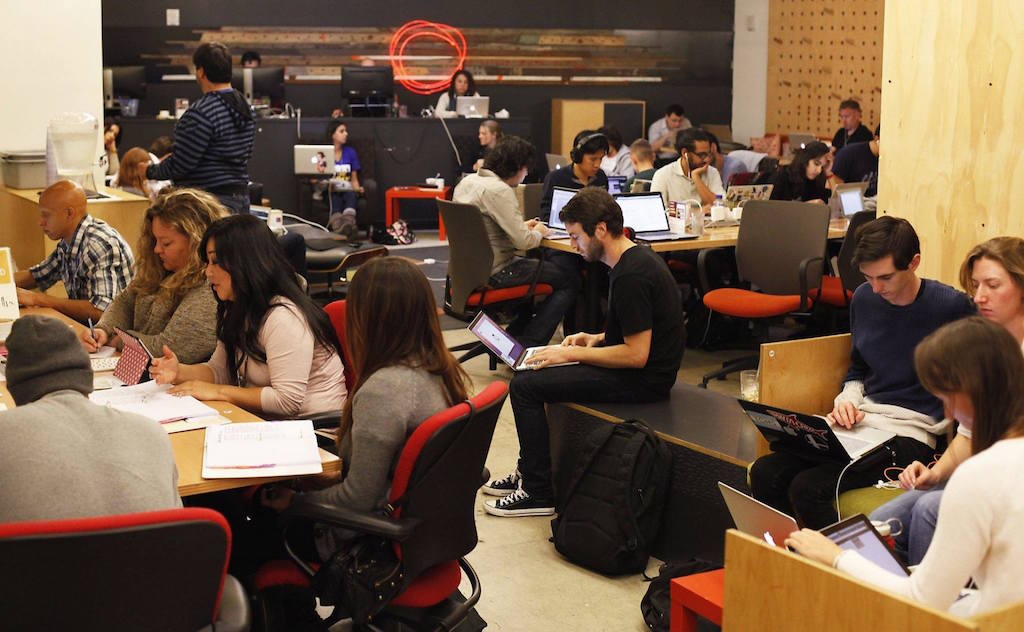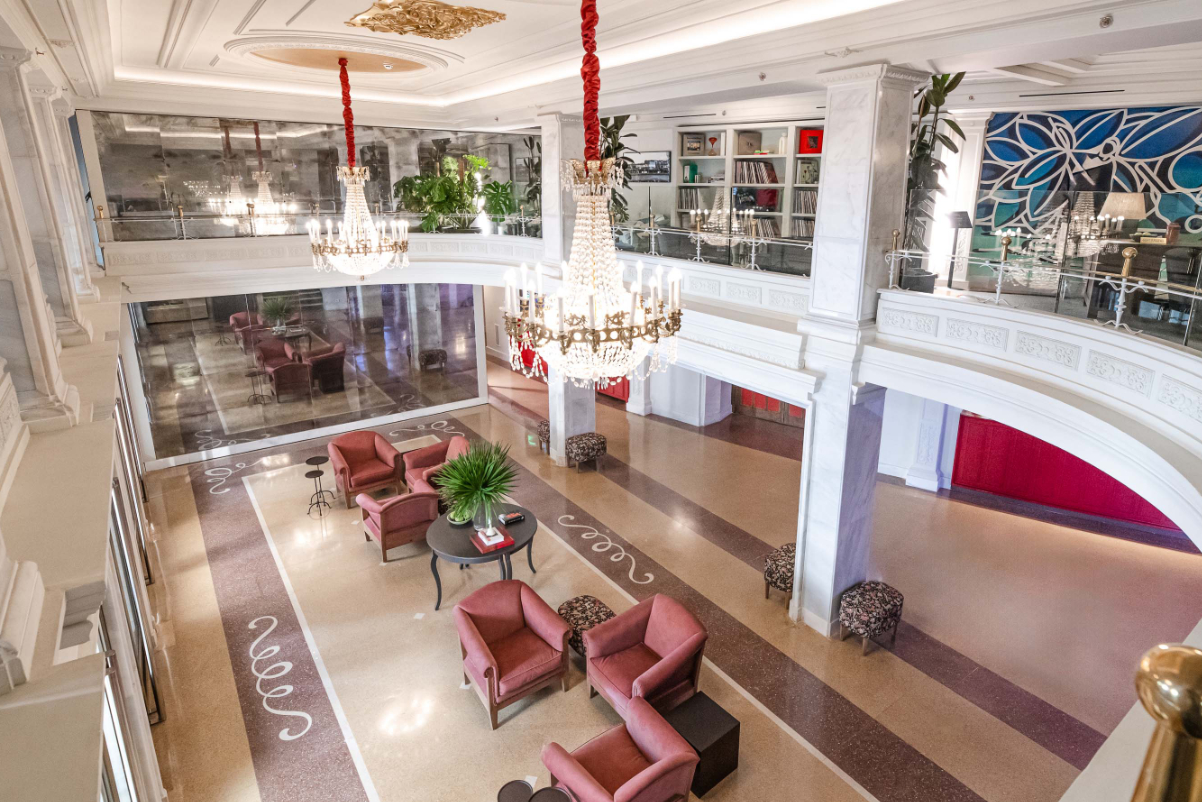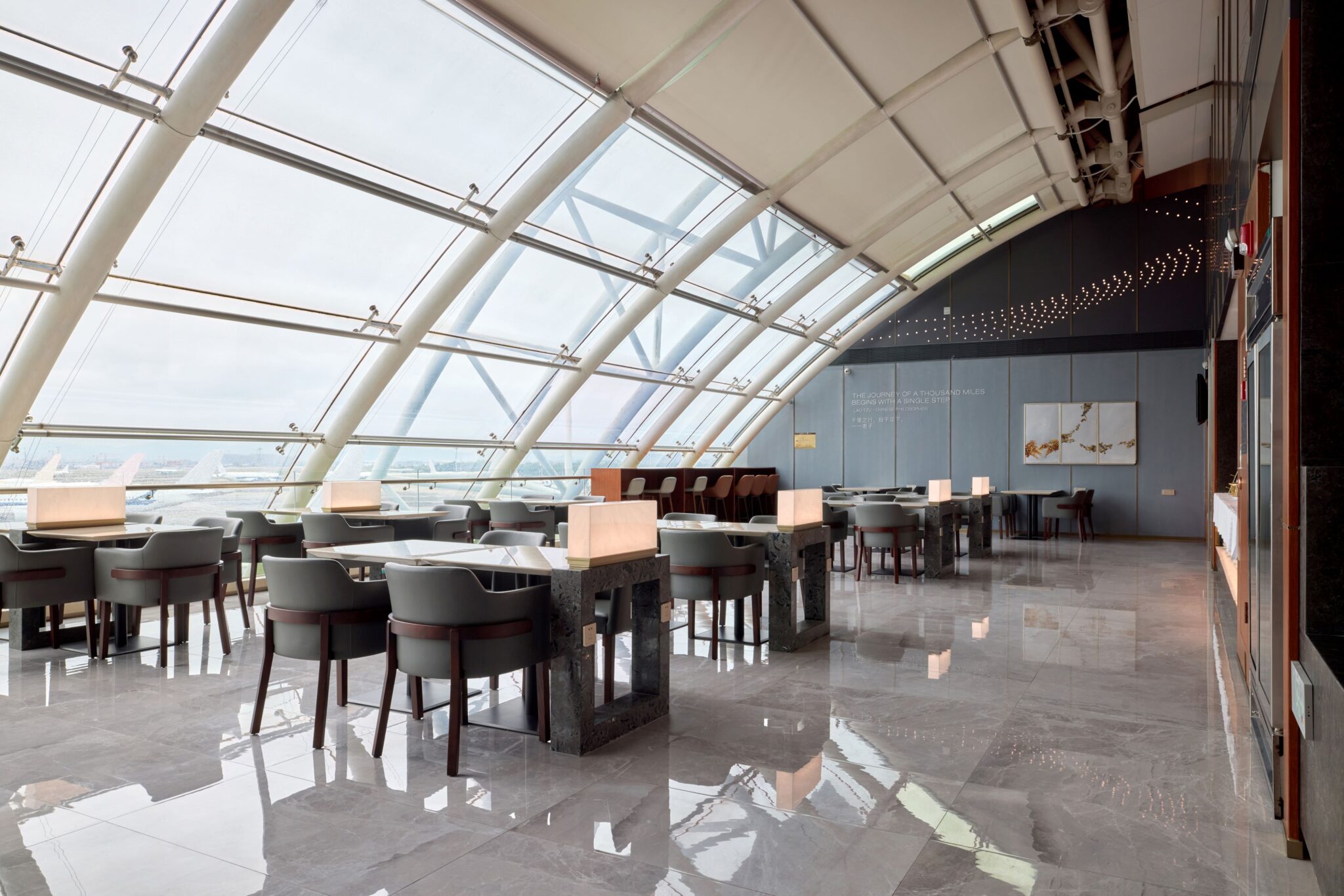Coworking Spaces Create Opportunity for a New Kind of Guest

Skift Take
The coworking phenomenon is growing not just because there’s a rising population of freelancers, as often cited, but because many people are craving variety, flexibility, and a chance to focus without interruption during their work day. This growth is increasingly blurring the line between office space and hospitality.
Except, for people who want to work on their laptops remotely on a regular schedule, whether they’re traveling or working locally, the choices are limited. There’s always a Starbucks or other coffee shop with Wi-Fi, but after a while people start feeling guilty about taking up a table for a couple hours. So you order another $6 coffee, tip well, and assuage your guilt for a moment.
But even then, the music is loud, people are talking on their phones, staff is moving chairs and banging dishes, kids are squealing, and there’s all kind of random movement behind your back, so you never really get in a zone. Of course, all of this is contingent on you finding a place to plug in.
The other choice is renting access to the growing number of cowork spaces, but that’s expensive for many people, running hundreds of dollars for a four-foot section of communal desk space. They’re also not generally applicable to travelers. Although companies like WeWork are expanding nationwide, so its members can use WeWork-owned spaces in other cities where they exist. For $350 per month.
“But what is there for the millions and millions of people who just want to pop in when they want, and they don’t really want to make a commitment?” asks Rich Menendez, founder of Workshop Cafe in San Francisco. “Because that’s me. That’s what I want.”
Open two years now on the edge of the Financial District, Workshop Cafe developed a business model and proprietary technology where people pay $2 per hour via their credit card stored in the Workshop app to use half of the restaurant dedicated for paying coworkers. The app also has an opt-in community page so you can meet people and potentially partner up on projects.
Workshop is now pretty much running at capacity, filled with stay-at-home freelancers, salaried office professionals, university students, and business travelers.
Presently, Menendez is speaking with investors to help him expand beyond the Bay area. There’s obviously a business model opportunity somewhere between Starbucks and WeWork at opposite ends of the coworking continuum. So we asked Menendez why other people haven’t opened similar establishments.
“I’ll tell you exactly why, because it’s hard,” he says. “The big one is software. You gotta get that part right, and that’s not cheap. There’s also the entire backend and operational dashboard where we can see what’s going on.”
In addition, Menendez says there’s staffing challenges to find the right type of people adept at working in restaurants and the cowork area where customers sometimes have basic tech questions. The marketing and operations also have to take into account the duality of the multi-purpose business, so there’s a lot of moving parts in this type of hybrid business.
The demand is clear, though. Apple even used the cafe in some of its advertising creative for the Apple Watch.
“We’re at the stage right now where we’re in talks with investors, and we’re going to start a metered expansion,” he explains. “If we do it right and we open just a few, then we can go hyper-scale from there. Our next growth spurt is going to be metered, it’s not going to be a ton of new Workshops at the same time. That wouldn’t be smart.”
The Psychology of Coffee Shop Coworking
Like many other people, Menendez was spending a lot of time working in coffee shops before his startup, and he always felt slightly uncomfortable after an extended period of time. He also wasn’t very productive.
Now, he says he keeps hearing from customers over and over about how much work they get done in his space. Menendez has one standing reservation for a company in Palo Alto, who sends 15 of its San Francisco-based engineers to the cafe every Wednesday because they say they always accomplish so much when they’re there.
He also has regular clientele who are working professionals coming from offices on the same block. People are visiting either because they want to shake up their work day a bit, or they need to escape their offices filled with too may distractions.
“A lot of it is people also come here just to be among the vibe and feel the energy of everyone else working,” Menendez adds. “We’ve heard so many times, which is why I believe in the product, people tell me. ‘I’m so much more productive here. I don’t even know why that is.'”
He thinks it’s because when people are working at a coffee shop, and they’re not paying for taking up space for long periods of time, that creates a sense of subconscious guilt, pressure to hurry up, and mental restlessness. There’s also people always shuffling around you who often aren’t in the same work mindset. They might just be checking email or social media, but it’s a pervasively different energy than paid cowork spaces where people are generally concentrating more intently on work-related tasks.
“There’s this element of your psyche where you’re sitting in a coffee shop, and you can’t really get into your zone because you’re in a fearful place, because you’re not paying to be there,” he says. “So you’re constantly on guard, thinking, ‘Oh, this place probably wants me to get out of here and free up the table for someone else. So you have this little devil on your shoulder, that’s like, ‘Dude you can’t sit here for three hours, right? Some of us have got to make some money.'”
Whereas, when people are paying for the right to be there, all of that’s removed. It changes your entire physiology where you’re able to exhale and focus more intently.
“So everyone is here for a purpose, and your mind just shifts into work mode because you stop sensing everything else that’s going on around you,” Menendez says. “Now everyone’s like, ‘Hey, they want me here.’ That makes all the difference.”
The community page in the Workshop Cafe app adds another layer to the overall experience where you can opt-in to share your profile and see who else is working around you, and their specific numbered chair. So someone might say they’re a Ruby on Rails developer and they’re looking for work. Accountants will provide the types of bookkeeping services they offer freelancers, or a lawyer might promote his experience with patent law.
“Because it’s opt-in, you’re basically saying it’s okay for people to come talk to you,” sums up Menendez. “Not everybody does that. A lot of people are like, ‘Hey, I want to go hide in the corner. That’s why I’m getting out of my office for two hours.'”




